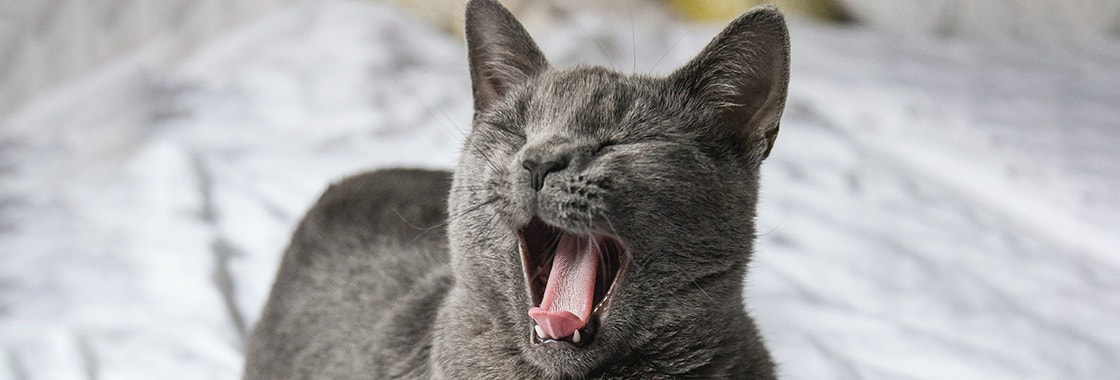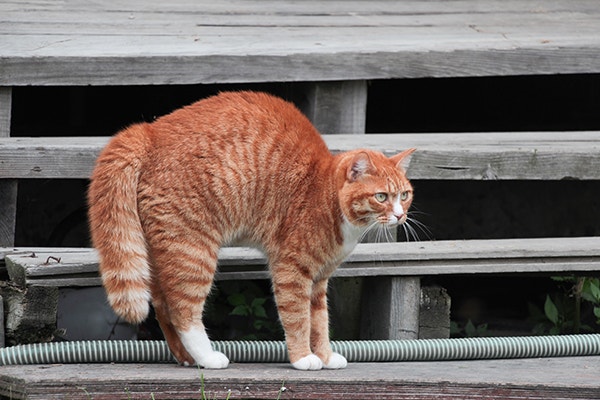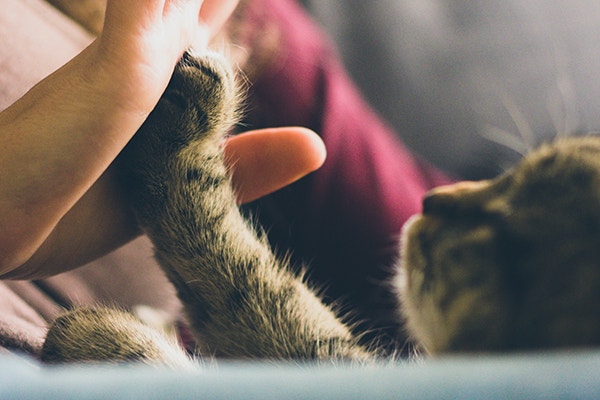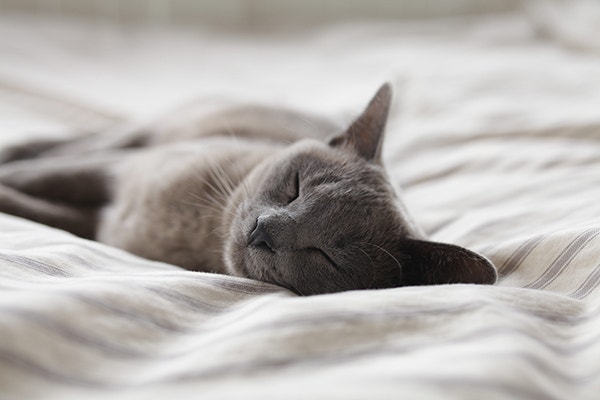- Homepage
- Blog
- Bonding & Care
- Cat Yawning
Cat Yawning: What does it mean?


Share
Cat parents will likely think that there is nothing cuter than seeing a cat yawn - somehow, cats can even make the simple act of yawning look graceful. While appreciating your cat’s yawn, you may wonder why do cats actually yawn? Although yawning is linked to both tiredness and wakefulness in cats, there are other possible meanings behind cats yawning. It’s important to understand your cat’s yawning behaviour, alongside their body language, to really learn what your cat wants and needs. In this article, we look at why cats yawn, what it means when a cat is yawning a lot, and how cat parents can respond. When you understand more about your cat’s behaviours, you’ll be able to communicate, support and bond with them better too.
Why do cats yawn?
Cats yawn as part of their waking up routine
Just like humans, cats yawn by opening their mouths, inhaling a lot of air and then exhaling it out. While there are different contexts that may cause your cat to yawn, the science behind yawning is typically the same for humans and cats. Yawning allows for more oxygen to be inhaled at once, which stimulates blood flow to the brain, and at the same time, carbon dioxide is exhaled. There are also brain chemicals involved in yawning, such as dopamine, oxytocin, serotonin and endorphins, all of which play a part in your cat’s mood and behaviour.
There are many reasons why cats yawn, including when they feel relaxed, tired, bored or stressed. We look at the 5 potential reasons why your cat yawns in more detail below:
Cats yawn when they are relaxed and content
A cat yawning is often a positive sign that they are feeling relaxed in their home environment. If they’re comfortable in their space and around familiar people, they’re unlikely to feel threatened. In this case, your cat’s yawn may release dopamine and endorphins, both of which are associated with pleasure and relaxation. If your cat yawns at you, it’s likely because they feel calm and content in your company.
Cats yawn when they’re tired and sleepy
Like humans, cats also yawn when they’re feeling tired - and since cats sleep a lot in a day, they’ll likely feel tired often. As they transition from wakefulness to sleepiness, you may notice your cat yawning, along with half-closed eyes and slowed movements. Cats thrive on routine, and yawning could be a habit to help prepare their bodies to sleep. It may also release serotonin in your cat, which can have a calming effect and lead to a more relaxed mood as your cat winds down.
Cats yawn as part of their waking-up routine
On the other hand, and similarly to humans, your cat could be yawning as part of their waking-up routine. The act of yawning involves taking in more air at once, increasing oxygen levels and blood flow to the brain, whilst also releasing carbon dioxide. This extra oxygen can help cats and humans become more alert and energetic as they wake up and prepare to be active - which is why cats yawning is often accompanied by a good long stretch.
Cats yawn when they’re feeling bored
If you find yourself yawning when you’re bored, this could also be the meaning behind your cat yawning too. You may see your cat yawning at you but not actually preparing to sleep, and instead maintaining eye contact and walking towards you. In this case, it might be that your cat is feeling bored and wants you to engage in playtime.
Cats yawn when they’re irritated or stressed
While cats yawning is a normal behaviour, sometimes it can indicate that they are feeling irritated or stressed - in which case it’s a calming signal. The physical act of yawning can increase serotonin levels and reduce cortisol levels, which is why cats may yawn to calm themselves and feel more relaxed after a stressful situation. Cat parents can observe their cat’s body language, as well as triggers in the situation, in order to properly understand the reason behind their cat yawning.
Excessive cat yawning: When to be concerned
Cats' behaviours can tell us a lot about how they’re feeling, which is why the meaning behind a cat’s yawning excessively needs attention. If your cat is yawning a lot, this could be an indicator of a potential health issue. Usually, if this is the case, your cat’s yawns will be accompanied by other signs or symptoms. This may include difficulty breathing due to respiratory issues, drooling from dental problems, or other changes in behaviour due to a psychological or medical condition, such as lethargy or loss of appetite. If you think your cat is yawning a lot, it’s important to observe any accompanying symptoms and consult a veterinarian if you’re concerned.
How to respond to your cat's yawning: Tips and tricks
As part of your responsibility to care for a cat, it’s important to understand their behaviours - including your cat’s yawns - to make sure you respond appropriately. This can help get a cat to like you and build a deeper relationship with your feline companion. We’ve listed 5 practical tips on what to do when your cat is yawning below.
- Observe the context in which your cat is yawning, for example if they’re waking up from a nap or preparing to sleep.
- Read their body language at the time that your cat yawns to understand their mood and behaviour, such as the position of their tail.
- Respond in a calm manner by using a gentle tone and giving your cat space to help them feel safe and relaxed.
- Provide a comfortable environment for your cat to retreat and rest when they’re feeling tired or overwhelmed, and consider using a plug-in pheromone device for serenity.
- Engage in regular play to keep your cat stimulated, prevent them from feeling bored and strengthen your bond.
- Consult a veterinarian if your cat is yawning a lot and you’re concerned about any accompanying signs or symptoms.
If there is anything that cats love more than their owners and food, it would likely be their sleep. Since the majority of a cat’s day revolves around sleep, cat parents are likely to notice specific behaviours from their cats as part of their sleeping or waking-up routines. Yawning is an entirely normal behaviour in cats, and as long as your cat is not yawning a lot and there are no other concerning signs, cat parents need not worry! Besides yawning, you may even notice your cat snoring while sleeping. By learning about your cat’s habits, you can know how to support them better and deepen your bond together.
CAT YAWNING: FAQ
Is it normal for cats to yawn a lot?
While it’s normal for cats to yawn, it is not considered normal if your cat is yawning a lot as it could indicate an underlying health issue if it’s accompanied by other symptoms. Cat parents should observe their cat’s behaviour closely if they feel their cat is yawning excessively.
Do cats yawn when happy?
Yes, cats yawn when they are happy - it signifies that they feel relaxed. Also, if your cat is yawning at you, this indicates that they feel safe in your company and reaffirms that they are happy felines. Yawning also releases endorphins, dopamine and serotonin, contributing to your cat’s happy mood.
Why does my cat keep yawning and licking his lips?
If your cat keeps yawning and licking its lips, this may be a sign of discomfort or stress, since both behaviours are calming signals used by cats. However, cat parents should observe the overall context, in case their cat is yawning and licking its lips whilst grooming or anticipating food.



